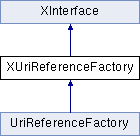creates URI references. More...
Inheritance diagram for XUriReferenceFactory:

Public Member Functions | |
| XUriReference | parse ([in] string uriReference) |
| parses the textual representation of a URI reference. | |
| XUriReference | makeAbsolute ([in] XUriReference baseUriReference, [in] XUriReference uriReference, [in] boolean processAdditionalSpecialSegments, [in] RelativeUriExcessParentSegments excessParentSegments) |
| resolves a relative URI reference to absolute form. | |
| XUriReference | makeRelative ([in] XUriReference baseUriReference, [in] XUriReference uriReference, [in] boolean preferAuthorityOverRelativePath, [in] boolean preferAbsoluteOverRelativePath, [in] boolean encodeRetainedSpecialSegments) |
| changes an absolute URI reference to relative form. | |
 Public Member Functions inherited from XInterface Public Member Functions inherited from XInterface | |
| any | queryInterface ([in] type aType) |
| queries for a new interface to an existing UNO object. | |
| void | acquire () |
| increases the reference counter by one. | |
| void | release () |
| decreases the reference counter by one. | |
Detailed Description
creates URI references.
See RFC 3986 for a description of URI references and related terms.
- Since
- OOo 2.0
Member Function Documentation
◆ makeAbsolute()
| XUriReference makeAbsolute | ( | [in] XUriReference | baseUriReference, |
| [in] XUriReference | uriReference, | ||
| [in] boolean | processAdditionalSpecialSegments, | ||
| [in] RelativeUriExcessParentSegments | excessParentSegments | ||
| ) |
resolves a relative URI reference to absolute form.
- Parameters
-
baseUriReference the base URI reference. If the given uriReferenceis a same-document reference,baseUriReferenceis used as a reference to the current document.uriReference any URI reference. Backwards-compatible relative URI references starting with a scheme component (see RFC 3986, Sections 5.2.2 and 5.4,2) are not supported; instead, they are interpreted as absolute URI references. processAdditionalSpecialSegments if TRUE, special segments (“.” and “..”) within the path of the base URI (except for the last, cut-off segment), and within an already absoluteuriReference, are processed as required by RFC 3986. IfFALSE, such special segments are treated like ordinary segments. Conformance with RFC 3986 requiresTRUEto be passed.excessParentSegments details how excess special parent segments (“ ..”) are handled. Conformance with RFC 3986 requires REMOVE to be passed.
- Returns
- a fresh object that supports com::sun::star::uri::XUriReference (and possibly also additional, scheme-specific interfaces), if the given
uriReferencecan be resolved to an absolute URI reference, relative to the givenbaseUriReference; otherwise,NULLis returned. Especially, ifbaseUriReferenceisNULL, or is not an absolute URI reference, or ifuriReferenceisNULL, thenNULLis always returned.
◆ makeRelative()
| XUriReference makeRelative | ( | [in] XUriReference | baseUriReference, |
| [in] XUriReference | uriReference, | ||
| [in] boolean | preferAuthorityOverRelativePath, | ||
| [in] boolean | preferAbsoluteOverRelativePath, | ||
| [in] boolean | encodeRetainedSpecialSegments | ||
| ) |
changes an absolute URI reference to relative form.
- Parameters
-
baseUriReference the base URI reference. uriReference any URI reference. preferAuthorityOverRelativePath controls how a relative URI reference is generated when both baseUriReference(e.g., “scheme://auth/a/b”) anduriReference(e.g., “scheme://auth//c/d”) have the same scheme and authority components, and the path component ofuriReferencestarts with “//”. IfTRUE, the generated relative URI reference includes an authority component (e.g., “//auth//c/d”); ifFALSE, the generated relative URI reference has a relative path (e.g., “..//c/d”).preferAbsoluteOverRelativePath controls how a relative URI reference is generated when both baseUriReference(e.g., “scheme://auth/a/b”) anduriReference(e.g., “scheme://auth/c/d”) have the same scheme and authority components (if present), but share no common path segments. IfTRUE, the generated relative URI reference has an absolute path (e.g., “/c/d”); ifFALSE, the generated relative URI reference has a relative path (e.g., “../c/d”).encodeRetainedSpecialSegments if TRUE, special segments (“.” and “..”) that are already present in the path component of the givenuriReferenceand which end up in a relative path returned from this method, are encoded (as “%2E” and “%2E%2E”, respectively).
- Returns
- a fresh object that supports com::sun::star::uri::XUriReference, if the given
uriReferenceis either already relative, or has a relative path, or is of a different scheme than the givenbaseUriReference, or can be changed to a relative URI reference, relative to the givenbaseUriReference; otherwise,NULLis returned. Especially, ifbaseUriReferenceisNULL, or is not an absolute URI reference, or ifuriReferenceisNULL, thenNULLis always returned.
◆ parse()
| XUriReference parse | ( | [in] string | uriReference | ) |
parses the textual representation of a URI reference.
- Parameters
-
uriReference the textual representation of a URI reference.
- Returns
- an object that supports com::sun::star::uri::XUriReference (and possibly also additional, scheme-specific interfaces), if the given input can be parsed into a URI reference; otherwise,
NULLis returned.
The documentation for this interface was generated from the following file:
- com/sun/star/uri/XUriReferenceFactory.idl